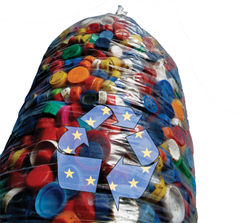The way ahead in waste
 The Government’s waste policy is starting to take shape. Higher landfill levies are designed to meet EU targets over two years but could also raise the cost of collection.
The Government’s waste policy is starting to take shape. Higher landfill levies are designed to meet EU targets over two years but could also raise the cost of collection.
Ireland needs a major move away from landfill to reach EU targets, according to Environment Minister Phil Hogan who hopes to finalise the Government’s waste policy by the end of the year. To start that process, Hogan has introduced the Environment (Miscellaneous Provisions) Bill to the Dáil which will almost double the landfill levy from September.
By 2013, Ireland will be limited to a maximum of 610,000 tonnes of landfill, down from nearly 1.3 million tonnes in 2009.
Stagnation and uncertainty, he claimed, had dominated waste policy since the 2007 review: “Right now, disposal – which is the most environmentally unsound option for dealing with our waste – is the cheapest. That position is simply not sustainable.”
The landfill levy will increase from €30 per tonne to:
• €50 per tonne from 1 September; • €65 per tonne from July 2012; and • €75 per tonne from July 2013.
A regulatory impact assessment on diverting household food waste from landfill, by using brown bins, is to be completed “shortly”. John Gormley’s draft waste policy, published for consultation last July, allowed for the phased introduction of food waste collections for households, starting from July 2011 in major cities.
A similar assessment, on changing the structure of the household waste market, is due to commence. This is expected to lead to competitive tendering for local waste collection services, with bidding from the private sector and local authorities.
Competitive tendering was recommended in the ESRI’s February 2010 report on municipal waste management policy (eolas issue 3, pages 42-43). Bids would be judged and awarded by the new utilities regulator. A public service obligation built into the contracts would include a fee waiver scheme for low- income households.
A review of existing producer responsibility schemes will also get under way, with a view to extending them and introducing a levy on packaging. Construction and demolition contractors would be required to take out mandatory compliance bonds for major projects, which could be refunded at completion, provided that waste is properly managed and recycled.
Hogan has signed regulations to incorporate the Waste Framework Directive into Irish law and he emphasises that any new waste policy must sit on the “bedrock” of the EU’s waste hierarchy.
An announcement on incineration policy is expected during the Bill’s committee stage but the Minister will not be going ahead with Gormley’s proposed levies i.e. up to €120 per tonne on both incinerated and landfill waste.
That policy would have ruled out the Poolbeg incinerator in Gormley’s Dublin South East constituency. In contrast to his predecessor, Hogan has insisted that the Poolbeg incinerator’s future is up to Dublin City Council and its contractor Covanta. A decision was due in May but has now been deferred to the summer at the earliest.
Meanwhile, Hogan is considering the Hennessy report on financing the Poolbeg incinerator, which was commissioned by Gormley; he will also take advice from the Attorney-General before its publication.
While the Bill allows for a plastic bag levy up to 70 cents, there are no plans to raise it beyond the current rate of 22 cents.
The Bill was introduced on 14 April and replaces John Gormley’s Environment Bill, which fell on the Dáil’s dissolution. “We need to make progress and to make up for lost time in driving forward our management of waste,” Hogan told TDs.
Sean Fleming, who is Fianna Fáil’s public sector reform spokesman, rejected the need for a utilities regulator, describing it as another quango; he preferred the Environmental Protection Agency taking on that role. Allowing local authorities to tender for waste for a set timeframe over a whole area was “anti-competitive”. There could also be a conflict of interest as councils were involved in granting planning permission for waste facilities.
Fleming added that the €50 levy from September will be a “stealth tax” that puts up the cost of wheelie bins; his bin charge was currently €350. He distanced Fianna Fáil from the Green Party’s approach to Poolbeg and said it was practical common sense to use the term incineration instead of “thermal treatment”.
In his view, waste should also be a free service to people on household benefits, to protect health and safety. Many people’s waste was not recorded in official statistics as they were no longer prepared to pay for a bin.
Sinn Féin’s environment spokesman Brian Stanley warned of the impact on the ordinary working person. The party continues to oppose incineration and Stanley called for increased fines for illegal dumping. Around 30-40 per cent of waste, he claimed, was not collected at all but ended up in ditches and hedges around the country.
He also wanted to see more waste planning powers devolved to local authorities and supported a waiver scheme for low income households.
Among the independents, Catherine Murphy sought more regulation for an already liberalised market and highlighted some constituents’ inability to pay for disposal. Thomas Pringle saw waste as a “public good” to be dealt with through publicly-owned facilities, collection and disposal. The Bill passed without a vote.
The most recent national waste report covers 2009 and was published in February 2011 by the Environmental Protection Agency. It shows a steady decline in waste generated, across the board, since 2007. The municipal landfill rate fell from 67 per cent in 2004 to 61 per cent in 2009. The household rate stayed higher at 71 per cent while the commercial rate was much lower (49 per cent).
Ireland’s landfill rate remains high by European standards. Sweden, Germany and the Netherlands all had under 5 per cent rates in 2008. The highest rates were found in Malta, Cyprus and the eastern Europe countries.
A snapshot of waste
| 2009 statistics | Municipal | Household | Commercial |
| Generated (tonnes) | 2,952,977 | 1,626,469 | * |
| Managed (tonnes) | 2,824,977 | 1,498,469 | 1,299,807 |
| Disposal rate (%) | 61 | 71 | 49 |
| Recovery rate (%) | 39 | 29 | 51 |
Source: National Waste Report 2009, Environmental Protection Agency Percentage figures rounded to give total of 100
*not available






